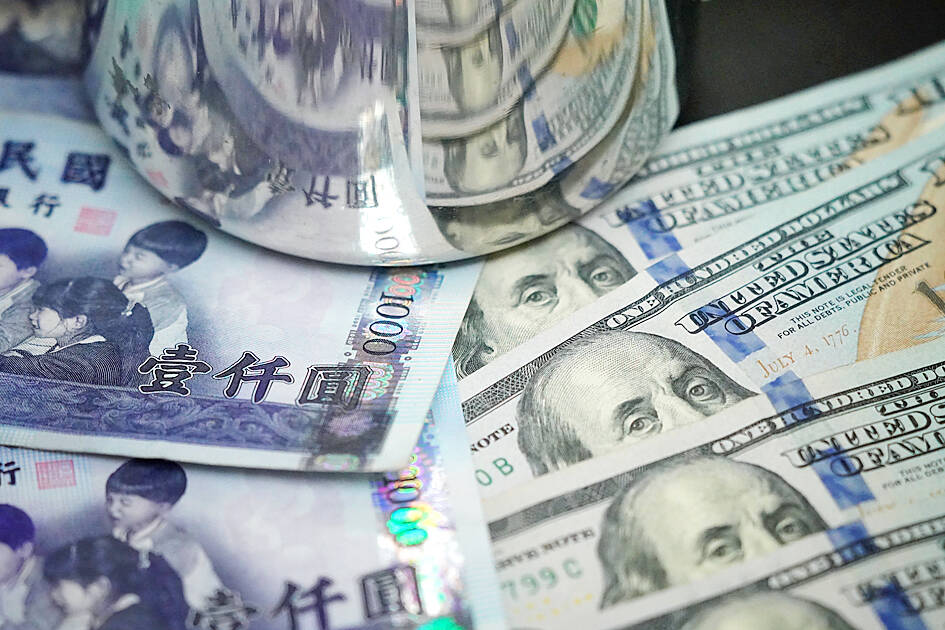Taiwan’s foreign exchange reserves last month slipped by US$1.13 billion to US$577.93 billion, as the central bank intervened a few times to shore up the local currency, the top monetary policymaker said yesterday.
Although the US dollar weakened 1.3 percent against other major currencies, the central bank spotted abnormal fund movements for a few days and waded in to help maintain the market’s stability, Department of Foreign Exchange Director-General Eugene Tsai (蔡炯民) said at a media briefing.
Investors at home and abroad had expected the greenback to lose momentum, in line with interest rate cuts of 50 basis points by the US Federal Reserve on Sept. 18.

Photo: CNA
However, depreciation expectations receded after Fed Chairman Jerome Powell later dismissed the chances of similar cuts for the rest of this year.
US bond yields recently returned to levels that were similar to before the rate cut, Tsai said.
Even so, the euro last month gained 0.77 percent against the US dollar, the pound rose 1.69 percent, the yen picked up 1.64 percent, the yuan increased 1.33 percent and the Australian dollar climbed 1.84 percent, Tsai said.
Capital outflows totaling US$6 billion accounted for the earlier swings in the NT dollar, the official said, adding that foreign portfolio managers wired abroad cash dividends and took profit in local shares, which rallied to relatively high levels last month.
Despite the lackluster showing, Taiwan remained the world’s fifth largest foreign exchange holder after China, Japan, Switzerland and India, Tsai said.

MULTIFACETED: A task force has analyzed possible scenarios and created responses to assist domestic industries in dealing with US tariffs, the economics minister said The Executive Yuan is tomorrow to announce countermeasures to US President Donald Trump’s planned reciprocal tariffs, although the details of the plan would not be made public until Monday next week, Minister of Economic Affairs J.W. Kuo (郭智輝) said yesterday. The Cabinet established an economic and trade task force in November last year to deal with US trade and tariff related issues, Kuo told reporters outside the legislature in Taipei. The task force has been analyzing and evaluating all kinds of scenarios to identify suitable responses and determine how best to assist domestic industries in managing the effects of Trump’s tariffs, he

TIGHT-LIPPED: UMC said it had no merger plans at the moment, after Nikkei Asia reported that the firm and GlobalFoundries were considering restarting merger talks United Microelectronics Corp (UMC, 聯電), the world’s No. 4 contract chipmaker, yesterday launched a new US$5 billion 12-inch chip factory in Singapore as part of its latest effort to diversify its manufacturing footprint amid growing geopolitical risks. The new factory, adjacent to UMC’s existing Singapore fab in the Pasir Res Wafer Fab Park, is scheduled to enter volume production next year, utilizing mature 22-nanometer and 28-nanometer process technologies, UMC said in a statement. The company plans to invest US$5 billion during the first phase of the new fab, which would have an installed capacity of 30,000 12-inch wafers per month, it said. The

‘SWASTICAR’: Tesla CEO Elon Musk’s close association with Donald Trump has prompted opponents to brand him a ‘Nazi’ and resulted in a dramatic drop in sales Demonstrators descended on Tesla Inc dealerships across the US, and in Europe and Canada on Saturday to protest company chief Elon Musk, who has amassed extraordinary power as a top adviser to US President Donald Trump. Waving signs with messages such as “Musk is stealing our money” and “Reclaim our country,” the protests largely took place peacefully following fiery episodes of vandalism on Tesla vehicles, dealerships and other facilities in recent weeks that US officials have denounced as terrorism. Hundreds rallied on Saturday outside the Tesla dealership in Manhattan. Some blasted Musk, the world’s richest man, while others demanded the shuttering of his

Taiwan’s official purchasing managers’ index (PMI) last month rose 0.2 percentage points to 54.2, in a second consecutive month of expansion, thanks to front-loading demand intended to avoid potential US tariff hikes, the Chung-Hua Institution for Economic Research (CIER, 中華經濟研究院) said yesterday. While short-term demand appeared robust, uncertainties rose due to US President Donald Trump’s unpredictable trade policy, CIER president Lien Hsien-ming (連賢明) told a news conference in Taipei. Taiwan’s economy this year would be characterized by high-level fluctuations and the volatility would be wilder than most expect, Lien said Demand for electronics, particularly semiconductors, continues to benefit from US technology giants’ effort